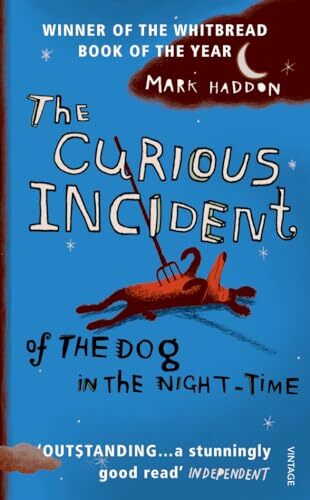
A book written from the perspective of a 15-year-old boy named Christopher who has some sort of developmental disorder like Aspergers or autism. Technically, this is a mystery story, but the mystery is not particularly interesting, and it takes a back seat to getting a glimpse of how someone with Aspergers or autism may experience the world. A few examples that I found especially interesting (minor spoiler alert):
-
Stimuli. Christopher easily becomes overwhelmed, which seems to be a central feature of his Aspergers/autism. Too much sound or too many new sights, and he shuts down, and has to block out all stimuli for a while to recover. I read Quiet: The Power of Introverts a while back and recall that studies found that, as babies, introverts also became easily overwhelmed and upset at overly stimulating situations (e.g., loud sounds), whereas extroverts tended to remain calm and not be as bothered. There seems to be something essential to how much stimulus a brain can handle; I’d be curious to learn more about it.
-
Lying. Christopher can’t lie because that requires thinking of things that didn’t happen, and whereas there is just one thing that actually did happen in reality, there are an infinite number of possible things that didn’t happen, and trying to think of them all overwhelms him. Christopher therefore doesn’t like metaphors, which he sees as lies (e.g., people don’t actually have skeletons in their closets) but he is OK with similes, which are true.
-
Humor. Similarly, Christopher can’t understand humor. When he hears the punchline for a joke, he sees all the multiple meanings and interpretations of that punchline, and instead of finding it funny, he gets overwhelmed.
-
Focus. Christopher also doesn’t know how to focus on what’s important and tune out the rest; instead, he “sees everything.” As a result, he doesn’t like going to new places. For example, if he walks into a train station he’s never been to, he immediately sees every single item—every sign, every person, every train, every escalator, every restaurant, every table, every chair, every plate, every utensil, and so on—and hears every sound, and of course, gets overwhelmed. On the other hand, when he goes to places he’s been before, like his own home, he only needs to pay attention to what has changed, which on a day-to-day basis, usually isn’t much.
-
Understanding. Not understanding what’s important or appropriate has some disturbing aspects to it too. For example, Christopher is emotionally overwhelmed from seeing the colors brown and yellow, but seems to have no emotional reaction to learning his mother died. Also, he dislikes physical contact, so while traveling in public, he hides a knife in his pocket, in case anyone should touch him.
I don’t know enough about Aspergers or autism to say if the book does an accurate job of depicting them, but I found the depiction in this book to be plausible and deeply fascinating.
Quotes
I’ve saved a few of my favorite quotes from the book:
The word “metaphor” means carrying something from one place to another . . . and it is when you describe something by using a word for something that it isn’t. This means that the word “metaphor” is a metaphor. I think it should be called a lie because a pig is not like a day and people do not have skeletons in their cupboards. And when I try and make a picture of the phrase in my head it just confuses me because imagining and apple in someone’s eye doesn’t have anything to do with liking someone a lot and it makes you forget what the person was talking about.
I like dogs. You always know what a dog is thinking. It has four moods. Happy, sad, cross and concentrating. Also, dogs are faithful and they do not tell lies because they cannot talk.
A lie is when you say something happened which didn’t happen. But there is only ever one thing which happened at a particular time and a particular place. And there are an infinite number of things which didn’t happen at that time and that place. And if I think about something which didn’t happen I start thinking about all the other things which didn’t happen. For example, this morning for breakfast I had Ready Brek and some hot raspberry milkshake. But if I say that I actually had Shreddies and a mug of tea I start thinking about Coco-Pops and lemonade and Porridge and Dr Pepper and how I wasn’t eating my breakfast in Egypt and there wasn’t a rhinoceros in the room and Father wasn’t wearing a diving suit and so on and even writing this makes me feel shaky and scared, like I do when I’m standing on the top of a very tall building and there are thousands of houses and cars and people below me and my head is so full of all these things that I’m afraid that I’m going to forget to stand up straight and hang onto the rail and I’m going to fall over and be killed.
